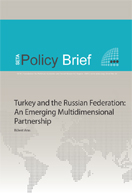Turkish-Russian relations have been transformed in a unique way since the late 1990s. Ever increasing economic relations have paved way for better political relations, bringing cooperation perspectives to fore while having competing agendas at the same time. The past several years witnessed confidence building between the countries as the relationship rose to the level of a multi-dimensional partnership; however, there are also ideational and material factors that limit Russian-Turkish partnership. The future of multi-dimensional partnership will largely depend on both countries’ ability to set a strong structural base for mutual and long-term beneficiary relationship.
Historically there were many wars between Russia and the Ottoman Empire until the end of World War I. Both countries have imperial legacies and have experienced post-imperial trauma. Great imperial legacies and feelings of isolation which followed the collapse of the respective empires are important factors which shaped the national memory of both countries. The new attitude of Turkish policy-makers has had a positive impact on foreign policy, allowing them to consider better relations with Russia and the possibility of cooperation to solve regional issues.
Turkish-Russian relations were transformed in a unique way during the aftermath of the Cold War era and there was a dilemma in bilateral relations in the early 1990s. The two countries were seemingly rivals in the newly emerging geopolitics of the Eurasia, while cooperating in the economic realm in an ever increasing manner. The relationship between the two countries was shaped by a combination of cooperation and rivalry. The strongest point of cooperation was the increase in trade relations. At the core of the rivalry between Russia and Turkey was the odd perception of the geopolitical roles pitted against each other as well economic matters such as energy.
The new foreign policy orientation of Turkish policy-makers has provided the impetus and the political will to develop better relations with Russia. In their perception of Russia, Turkish policy-makers emphasize adopting a good neighborhood and zero- problem policies in the bordering regions. Turkish politicians have also made developing bilateral political and economic relations with Russia a priority. Furthermore, they also think of Russia as a necessary partner for regional peace and stability in Eurasia. Prime Minister Recep Tayyip Erdoğan mentions Russia “as an important country from the perspectives of trade, investment, tourism, and energy security.”
From Rivalry to Cooperation Political relations overshadowed the booming economic relations and created a lack of trust and confidence between the states for a long period of time. The volatile nature of political relations was the main factor in the problematic history of relations between the states with a record of several serious crises in the 1990s. The policy-makers had to deal with the remnants of the Cold War and were under pressure due to the Kurdish and Chechen problems in their bilateral relations. Turkey’s Caucasian Diaspora was active in supporting Chechens in their struggle against the Russian army and in turn, the Russian administration was tolerant towards the PKK activities in Russia. The all time record in economic relations played a catalyzing role for balancing political relations.
Economic relations hit a high in 1997, which also witnessed the visit of the Russian Prime Minister Viktor Chernomyrdin to Turkey in December. There was further development of economic relations on the agenda during this visit.2 High level officials started to refer to their relatio










